India
The Time I Died in Ladakh
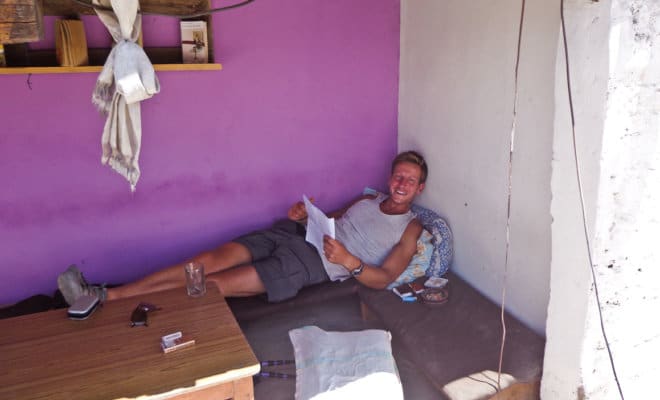
The author, a month into his recovery.
Travel for me had never been a means of meeting new people, but of meeting awe and wonder amidst natural beauty.
In the month I’d been there, India had wiped the floor with me. There had been the obligatory tummy-troubles, of course, but also a robbing at the hands of a police officer in Agra, a raid on my hotel room in Chandigarh, and several near-death experiences dodging traffic in Delhi and Jaipur streets.
During a phone call home, my girlfriend had attempted to comfort me with some wisdom sourced from her Facebook newsfeed — “life will send you exactly the challenge you need exactly when you need it,” or something of the sort. She’d been less forthcoming with why I might’ve needed to run a month-long gauntlet of uninterrupted harassment, petty theft, diesel fumes, and multiple other assaults on my unsuspecting senses.
After a few days consulting maps, I settled on a course of escape: Zanskar, Ladakh — 7,000 kms of nothing but mountains and the odd minor settlement or monastery at day-or-two intervals. The trek across it would be a 21-day epic to which I casually added an extension of 12 that would take me to the sacred lake of Tso Moriri.
“But alone?” asked the group of young Delhi guys I’d met at the bus station in Leh.

Tibetan monk in Ladakh. Photo Credit: Bigstock
Alone. Alone was the way I did things. Travel for me had never been a means of meeting new people, but of meeting awe and wonder amidst natural beauty. Since I was diagnosed with bipolar disorder as a teenager, moreover, solitude had, in fact, become something of an obligation, and more of a saving grace than any other medication or therapy I’d known. Beyond this, I was also there to prove something. That I needed no one, maybe. That, left alone to my private trysts with awe, wonder, and the other delights of raw, gentle nature, I could actually prosper.
Just how alone I’d be sank in as the bus spat me out into the arid dusk in Lamayuru and I saw the spread of lofty mountains into which I’d shortly venture. That unsayable sentiment which had led me into such places repeatedly over the years — a fusion of curiosity, adventure, and a kooky sort of pious reverence — found its pulse.
I set off at 3 am the next day. Miltonesque moonscapes of every hue of red and orange waited around every bend in the trail. Some of the surrounding outcrops and peaks looked as though shaped by the hands of a master potter, others like he hadn’t quite got to them yet, and it was impossible to say which was more aesthetically captivating. Should Blake and O’Keefe have collaborated over a landscape both Hadean and Elysian at once, I imagined, this would have been the likely result.
I reached the settlement of Hanupata just as the sun concluded its brutalities for the day and set up camp a mile or so past the last of the village’s pastures. Just before dark, my evening meditation was disturbed by an elderly lady clad in what looked like yak skin who sat outside my tent and stared at me for at least an hour before finally moving on.
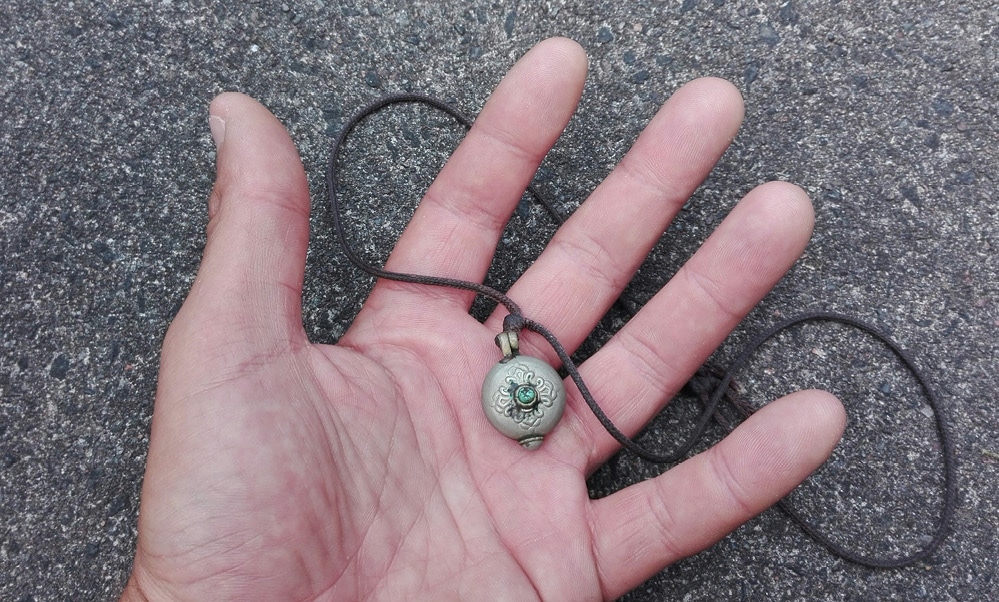
The Buddist Vajra amulet the author’s sister gave him before the trip to keep me safe; it worked!
The next morning my hopes for a peaceful stomp through lonely miles of empty wilderness were sunk with the sighting of a trekking group plodding their way up the trail. Without much thought on the matter, I made the necessary revisions to my itinerary, deciding on a long detour through a hanging valley to the west. I marched until dusk and set up camp, having already covered six days of walking by guidebook estimations in less than two.
I was up by 3 am again the next morning, this time awoken not by my excitement, but a raucous sing-song in my bowels which necessitated a frantic dash to the scrub. A small part of me suspected it would be best to stay put for a while, but the thought was vetoed the instant I looked up and saw the silhouetted peaks through which I’d spend the day walking.
My progress towards the next pass was hampered by the tummy thing, which required that I stop every few hundred steps to let it settle before continuing. Just short of the pass I stopped for a drink. The first flickers of dawn were kissing the crowns of the surrounding peaks, a sight almost enough to make me forget the ongoing hostilities in my gut. Almost. A slug from my water bottle provided a crude memento, staying in my stomach for all of five seconds before coming up again along with everything I’d eaten the day before. A second bout a few minutes later disabused me of any notion that things might be a culturally curve-graded version of “ok.”
Crap.
The night before I’d lay pondering the many wonders that lay ahead, unable to hear the laughter of whatever demon had already occupied my stomach and was planning mischief of a kind I could not then have imagined.
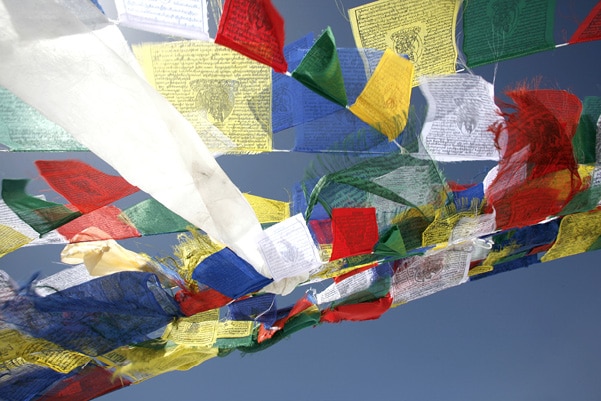
Praying flags in Ladakh. Photo Credit: Bigstock
I vomited a few more times and suffered an insult-to-injury bout of diarrhea before finally acknowledging the facts: I was sick, quite badly so, and my great Himalayan adventure was over. I had to turn back.
I made it within sight of the previous night’s camp in a poor state and threw myself inside my tent. I had no inkling of time, but for the change in light each time I crawled outside to vomit or excrete the entirely liquid contents of my bowels. Daylight passed in seconds, only to return again with renewed, brutal intensity between alternate flashes and seeming eons of darkness. It wasn’t until several weeks later that I’d learn this unreasonably graphic preview of hell spanned a total of four days. On what later transpired to be day five I was woken by my stomach’s latest effort in its crusade to vacate itself and crawled outside.
I woke some minutes or hours or days — who knew? — later, in a puddle of my own filth, somehow having strayed some 200 yards from my tent. Where I’d planned on going was beyond me. I managed to focus my eyes on the mess I’d excreted all over myself and the rocks beneath me and realized it was marbled with streaks of blood.
I needed water. Shortly before dawn I set off in the direction of the trekking path in search of a stream. By the time I’d found one, the sky was again preparing its nocturnal garb.
I woke in the morning sun, my shorts now sporting as much claret as their original khaki. A kind thought told me that if I just lay there, sooner or later someone was bound to find me. Logic soon intervened, reminding me that I had seen no one for days barring the few villagers and a handful of trekkers. For the first time, I was forced to acknowledge the possibility that I might never make it out of there, coming to the bleak realization that it was, as they say, do or die.
But do what?
I decided to crawl. I crawled for what felt like days.
Left knee forward, right knee forward, left hand forward, right hand forward.
“Life will send you exactly the challenge you need exactly when you need it.”
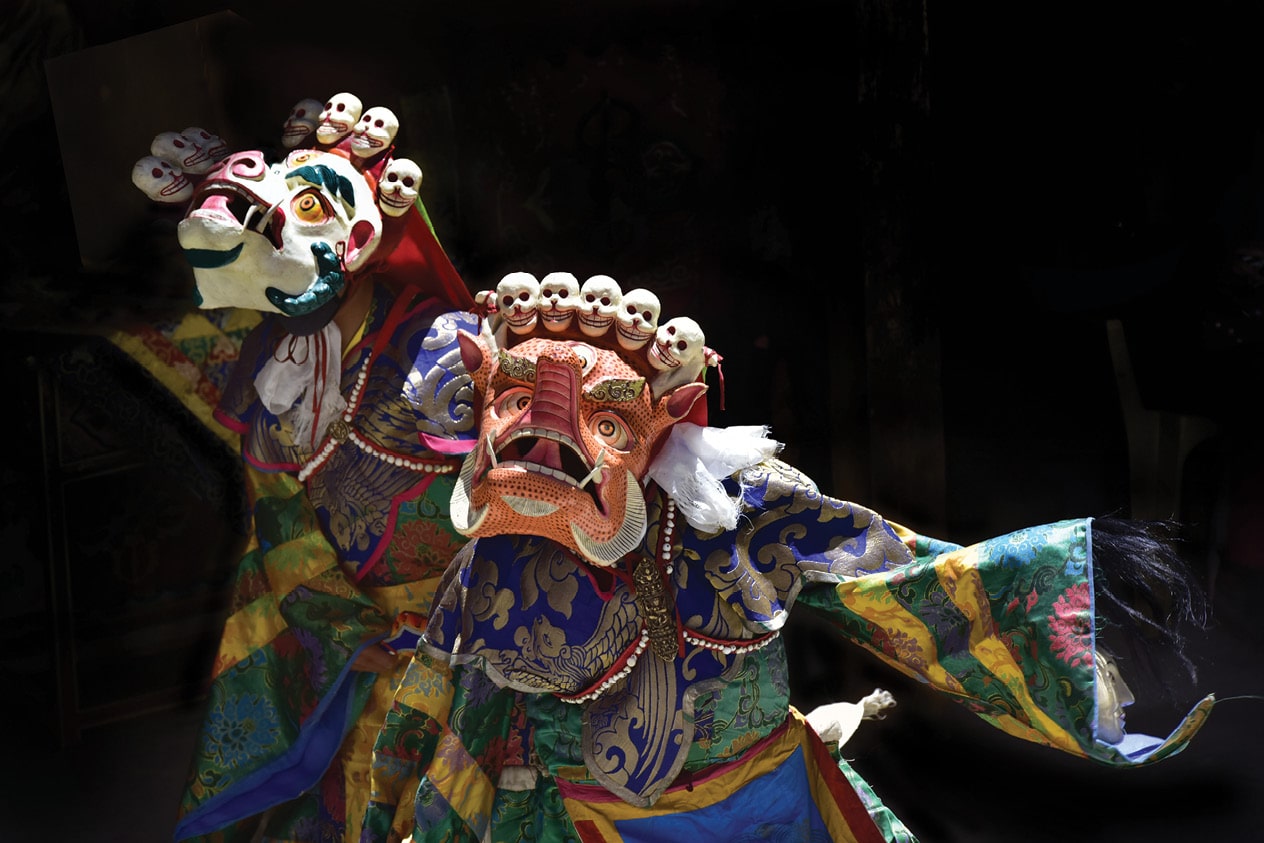
Mask Dance at the monastery in Karcha, Zanskar. Photo Credit: Bigstock
One morning, I woke and found the yak-skin lady outside my tent, watching me again, and, it seemed, quite oblivious to my suffering. As she sat there, swatting at her wild bushels of hair, gibbering to herself or mumbling broken lines of some mantra or other, it became apparent that fate had a lively sense of humor, having sent for my salvation the village’s choicest lunatic. When I next woke she was gone.
At some point in the ordeal I managed to stand. I’d only hobbled a few paces along, however, when my impaired sense of balance forced me to stop. I scanned the terrain below me for some sign of the path, of the village, anything. Then, as my vision cleared, I saw something I will never forget.
On a wide slope to my left, a girl was padding her way down through a boulder-field. She really was; at least two minutes of gawping in disbelief didn’t disprove it. She stopped and squinted in my direction for some time, unsure what to make of me, then lifted the other hand and waved. My cracked lips stung as a smile tried to rise on my cheeks. All the fear and tension I’d carried with me those past days summarily disarmed, transformed by the simple alchemy of this token human gesture. The last of my strength finally gave out.
I woke facing a ceiling of sticks and mud. My chest was drenched in vomit and underparts in a viscous slop of claret. Someone had placed a wet rag on my brow. Beside me other rags which had evidently been used to clean up my prior messes were soaking in a pale of water. I drifted off again in a fit of shivers.
I next woke to what seemed the biggest pair of brown eyes I had ever seen. The girl. One of her hands was kneading mine gently and with the other she poured a little water onto my lips. I was clean again, my clothes removed and modesty maintained by a scrap of cloth.
The girl came and went over the next few days. I felt no better, but eventually imagined I could detect the cadence of my own language in her words. One morning the girl told me a jeep would be passing in two days’ time and the driver would be able to take me to a hospital. I felt myself on the verge of a smile, but before it had fully formed saw a tear tumble from the girl’s cheek and was reminded that the likely cause of her grieving was the severity of my condition.
When I next woke the room was dark. The girl was gone, but I detected a presence in the room and could hear the faint but guttural warblings of a voice. It was the yak-skin lady, rocking away and reciting a mantra again. Despite the peculiarity of it, I was relieved she was there, to have some human presence beside me. The relief ended, however, when I realized what she was doing.

Karcha monastery Zanskar. Photo Credit: Bigstock
For almost a year before leaving for India I had trained in the Buddhist practices on death and impermanence. After listening to her for maybe an hour or more, I eventually grasped that the yak-skin lady was reciting the phowa, Tibetan Buddhism’s equivalent of Christianity’s last rites, or thereabouts, and used to guide the dying through the interlude between death and rebirth.
Even in my vomity and feverish and feculent straits, I couldn’t help but think the act a tad melodramatic. I wasn’t actually dying! I wasn’t, was I?
The girl returned shortly afterwards, bearing news of a plan to carry me to the nearest village, where they might sooner find a vehicle to take me to a hospital. Before she had finished her explanation a younger girl appeared in the doorway breathless and sweating, with more favorable tidings: there was a vehicle below.
I next woke halfway between a military ambulance and the entrance to the hospital in Leh, where I was to remain for the next week, strung to an imbroglio of IVs slowly coercing the acute invasive amoebic dysentery out of my system and replacing all the blood I’d lost.
A few days into my stay in the hospital, my unoccupied mind happened again upon the memory of my girlfriend’s words. Life will send you exactly the challenge you need exactly when you need it. Why I’d needed amoebic dysentery when slap bang in the middle of nowhere was, I’ll admit, at first a mystery, but as the days passed and granted a degree of perspective over the preceding weeks and all that had happened, I finally got it…
The doctor in Leh told me that shortly after my arrival, momentarily, I’d been technically dead, my heart having stopped for nearly a minute before I was resuscitated. With the benefit of hindsight, I can now say that this physical, medical death coincided with another — that of the poor sod who’d traipsed in there, rich in a sense of adventure and self-reliance, but lacking in any understanding of the awe and wonder to be found in the experience of basic humanity, and who never would have known countless other pleasures and worthwhile earthly merits and experiences had he not died this small death in the wilds of Zanskar. He stands humbled, corrected and bettered by his demise.

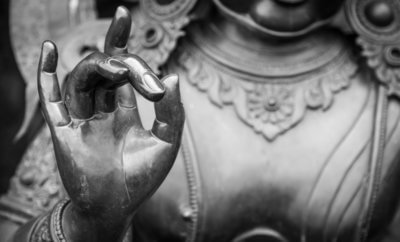
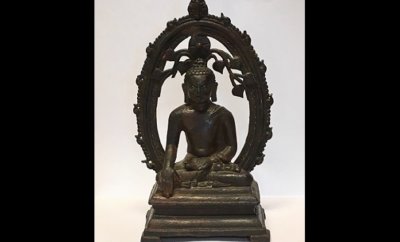
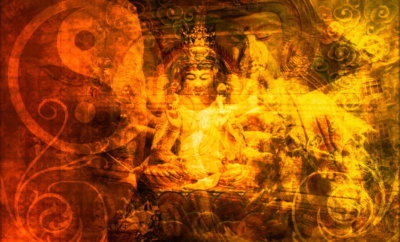
1 Comment
You must be logged in to post a comment Login